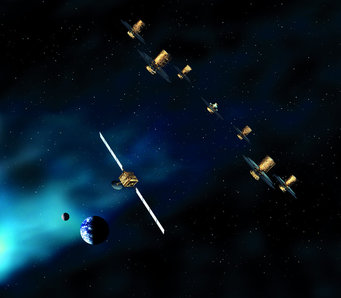Are there Earth-like Planets near other Stars?
The Max Planck Institute for Astronomy in Heidelberg has organized the first international conference with the emphasis on the space missions "DARWIN" and "Terrestrial Planet Finder"
Two extremely demanding space missions, "DARWIN" (ESA) and "Terrestrial Planet Finder" (NASA), are scheduled to search for planets outside our solar system (extrasolar) starting in 2014. The first international conference to prepare for these missions will be held in Heidelberg April 22 - 25, 2003. Prominent scientists and space technology experts will participate, among them Prof. Steven Beckwith (Baltimore), Director of the Space Telescope Science Institute; Prof. Michel Mayor (Geneva), the discoverer of the first extrasolar planet; and Prof. Jill Tarter (Mountain View, USA), Director of the SETI Research Institute.
The first planet orbiting a star other than our Sun was detected in 1995. With this fundamental discovery, the eternal question of the cosmic uniqueness of our life-bearing Earth was removed from the realm of pure speculation and put on a firm scientific basis. Astronomers all over the world immediately began collaborations to extend this basis and to interpret the newly obtained observational results. To date, more than one hundred extrasolar planets are known. These are all »giant planets«, similar to (or even larger than) Jupiter. They are also located quite close to their parent stars, simplifying the detection process. Because of their size and proximity to their suns, these planets are not likely to harbor life. Finding planets similar to the Earth is considerably more difficult, and so far, none are known outside our solar system.
The detection of terrestrial extrasolar planets and the detailed study of the conditions prevailing on their surfaces, including the potential presence of life, will require a variety of technological breakthroughs. Both ESA in Europe and NASA in the United States have accepted this challenge and are preparing two extremely demanding international space missions: »DARWIN« (ESA), and »Terrestrial Planet Finder« (NASA). Both missions are planned for launch in the year 2014.

In order to prepare for these missions, scientists and engineers from a variety of fields will be working together in international consortia. To coordinate this work, a series of conferences has been conceived, the first of which will be held in Heidelberg from April 22nd to 25th, 2003. The conference, organized by the Max Planck Institute for Astronomy, is entitled:
Toward Other Earths. DARWIN / TPF and the Search for Extrasolar Terrestrial Planets, Heidelberg, City Hall
Date of the Conference: April 22nd - 25th, 2003
Topics:
- Planet search methods
- Earlier projects and their role as precursors for DARWIN / TPF
- Planet formation and evolution
- Astrobiology in the context of Darwin / TPF
- Technological developments for DARWIN / TPF
Prominent scientists, experts in space technologies, representatives of the space agencies and industrial firms from all over the world have announced their participation. Confirmed speakers include:
- Steven Beckwith (Space Telescope Science Institute, Baltimore)
- Charles Beichman (Jet Propulsion Lab., Pasadena)
- Pascale Ehrenfreund (Leiden)
- Martin Harwit (Cornell)
- Alain Léger (Paris)
- Michel Mayor (Geneva)
A press conference will take place on Wednesday, April 23rd, 2003, from 10:00 to 11:00am. at the Conference Center. Participants will include:
- Thomas Henning (Heidelberg), Managing Director of the Max Planck Institute for Astronomy
- Michel Mayor (Geneva), discoverer of the first extrasolar planet
- Malcolm Friedlund (ESA), Project scientist for DARWIN
- Charles Beichman (Pasadena, USA), Project scientist for TPF
- Jill Tarter (Mountain View, USA), Director of the SETI Institute
A public lecture by Jill Tarter, Director of the SETI Research Institute (SETI = Search for Extraterrestrial Intelligence), will take place on Tuesday, April 22nd, at 8:00pm. The title of the lecture is: "SETI: Science Fact, Not Fiction"
